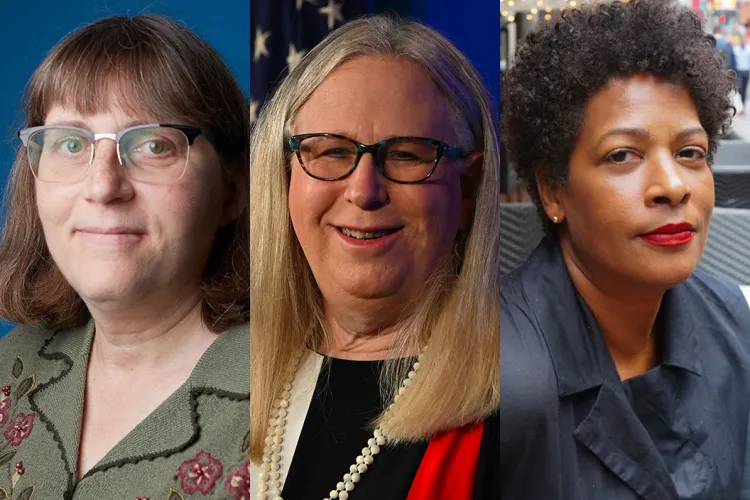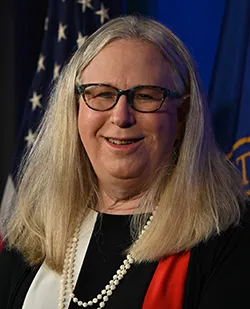Philosopher, Health Secretary, and Filmmaker Named 2021 Honorary Degree Recipients

President Valerie Smith will award honorary degrees to philosopher Elizabeth Anderson ’81, U.S. Assistant Secretary of Health Dr. Rachel Levine, and filmmaker Dawn Porter ’88 at Swarthmore College’s 149th Commencement on June 6. In addition, approximately 350 undergraduates will receive degrees during the online ceremony.
Anderson and Porter will each receive the degree of Doctor of Humane Letters, and Levine will be awarded a Doctor of Sciences degree.
Elizabeth Anderson ’81

In her work as a philosopher, Elizabeth Anderson ’81 examines how evolving concepts of freedom and equality are experienced in our daily lives.
Anderson, the Arthur F. Thurnau Professor and John Dewey Distinguished University Professor of Philosophy and Women’s & Gender Studies at the University of Michigan, specializes in ethics, social and political philosophy, feminist theory, social epistemology, and the philosophy of economics and the social sciences.
In 2019, she was named a MacArthur Fellow for her extensive body of work and pivotal contributions to a number of philosophical debates concerning the ways various institutions, policies, and social practices structure relations among people and serve to promote or hinder democratic equality and human flourishing.
In addition to her MacArthur grant, she has won a fellowship from the American Council of Learned Societies, was elected to the American Academy of Arts and Sciences, and served as president of the Central Division of the American Philosophical Association. A 2019 profile in the New Yorker said Anderson “may be the philosopher best suited to this awkward moment in American life,” and a 2020 article from Prospect magazine listed her as one of the top 50 thinkers for the COVID-19 era.
As she articulates in her 1999 paper “What Is the Point of Equality?” Anderson understands equality to be fundamentally concerned with equal relations among people rather than the equal distribution of goods, such as income and wealth. She builds upon this landmark paper in her 2010 book, The Imperative of Integration, in which she incorporated decades of economic, sociological, and psychological research on the effects of racial segregation as a cause of status inequality between Black and white Americans.
In her 2017 book, Private Government: How Employers Rule Our Lives (and Why We Don’t Talk About It), Anderson calls attention to the ways that many employers exercise a far more sweeping scope of power and arbitrary authority over workers’ lives, speech, and privacy than is fully acknowledged in public discourse.
A Phi Beta Kappa recipient, Anderson majored in philosophy at Swarthmore and later earned an M.A. and a Ph.D. from Harvard University. She was a visiting instructor in philosophy at Swarthmore from 1985 to 1986 and a teaching fellow at Harvard from 1983 to 1985 before joining the University of Michigan in 1987.
Dr. Rachel Levine

Dr. Rachel Levine, the assistant secretary of health in the U.S. Department of Health and Human Services, is the first openly transgender federal official to receive Senate confirmation.
During her time as Pennsylvania’s health secretary from 2017 to 2021, Levine helped shape and execute the commonwealth’s response to the COVID-19 pandemic, leading with a data-driven approach and providing Pennsylvanians with a sense of calm and reassurance amid the disruption brought about by the health crisis.
Earlier in her career, as Pennsylvania’s physician general, a position to which she was unanimously confirmed in 2015, Levine dedicated herself to mitigating the state’s opioid crisis, signing an order that allowed law enforcement officers to carry the anti-overdose medication naloxone. The effort is credited with saving the lives of almost 1,000 people.
While working at Penn State Hershey Medical Center from 1996 to 2015, Levine, a pediatrician, specialized in treating children, adolescents, and adults with eating disorders, and started the medical center’s program in that field, which was uncommon at the time.
One of the most visible transgender government officials in the country, Levine has been a staunch advocate of LGBTQ rights throughout her career. As Pennsylvania’s secretary of health, she led an LGBTQ workgroup for the governor’s office, which worked to create programs and processes that are fair and inclusive in health care and insurance. In 2017, Levine was recognized as one of NBC’s #Pride30, a national list of 30 people who are both members of and making a difference in the lives of the LGBTQ community. While at Penn State, she was the liaison for the LGBT community for the Office of Diversity at the Penn State College of Medicine, establishing an LGBTQ faculty and staff affinity group, and she was the facilitator for the LGBTQ student group.
Levine graduated from Harvard University in 1979 and the Tulane University School of Medicine in 1983. She completed training in pediatrics at Mount Sinai Medical Center in New York City in 1987 and a fellowship in adolescent medicine at Mount Sinai the following year.
Dawn Porter ’88

Dawn Porter ’88 is an award-winning filmmaker and the co-founder of Trilogy Films, a production company that specializes in social justice documentaries and independent feature films. Porter, who began her career as an attorney, left what she describes as a “stable direct-deposit job” in corporate law to pursue filmmaking.
Porter’s directorial debut, the 2013 documentary film Gideon’s Army, followed the lives of three young, idealistic public defenders in the Deep South struggling to represent their clients amid underfunded and understaffed offices. The film takes its name from the landmark 1963 Supreme Court case Gideon v. Wainwright, which guaranteed the accused’s right to counsel. Gideon’s Army received far-reaching acclaim from the Sundance Film Festival, where it earned the event’s top editing prize. The film went on to receive an Emmy nomination and a Peabody Award, among other prizes.
Porter’s second project, Spies of Mississippi, debuted on PBS in 2014 and told the story of that state’s efforts to preserve segregation during the 1950s and ’60s.
Trapped, Porter’s third film, premiered at the 2016 Sundance Film Festival, where it received the special jury social impact prize. Trapped chronicles the lives of medical professionals in the South who work at clinics subject to specific laws that regulate abortion providers. Upon the film’s release, Paste magazine named Porter one of 10 Black directors to watch.
In 2018, her four-part series Bobby Kennedy for President debuted on Netflix and explored the evolution of a celebrity politician and his significance in American politics. Through her work on that series, she got to know the subject of her 2020 documentary John Lewis: Good Trouble, which premiered in Tulsa, Okla., on June 19 to commemorate Juneteenth and serve as a protest of a Donald Trump campaign rally planned in the city on the same day. Honoring civil rights icon and longtime congressman John Lewis, the film received widespread praise including the Critics Choice Award for best political documentary and an NAACP Image Award. That year, she also released The Way I See It, a documentary feature focusing on Pete Souza, the former chief official White House photographer.
When Porter delivered Swarthmore’s 2013 McCabe Lecture, she discussed filmmaking and how the College shaped her career: “What I think is so crucially important … is the culture and community and commitment to justice and fairness that is really in the ether here.” Porter graduated from Swarthmore with a degree in political science and earned a J.D. from Georgetown Law Center. She is the parent of a member of the Class of 2024.



